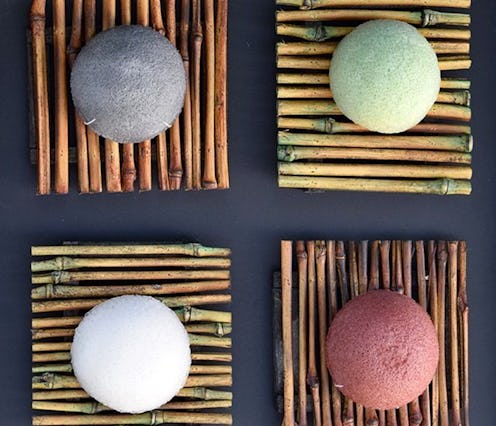Style
What's The Best Clay To Use For Your Skin Type?
When your skin is feeling dirty and congested, you might turn to a clay or charcoal treatment to help detoxify and deep-clean. But even though these ingredients can definitely reset and restore your skin, are you using the right clay treatment for your skin type? After all, those differently colored masks, washes, and konjac sponges aren't just for looks. Charcoal along with red, green, and white clays all serve different purposes, and some are better than others for oily, dry, or even sensitive skin. So to better understand which clay or charcoal is best to use for various needs, I emailed with Jordana Mattioli, NYC-based esthetician, and Michelle Fry, Director of Product Development for Boscia.
According to Fry, even though charcoal and clays have a reputation for reducing oil and removing dirt and other impurities from the skin, they can actually treat other issues as well. "Some clays provide added benefits such as hydration, exfoliation, reduction of redness or pore size, and even antibacterial properties that help alleviate and treat breakouts," says Fry. And these different benefits, explains Mattioli, are determined by the various minerals, oxides, and organic matter, which are dependent on where the clay is found. So you know which type of clay or charcoal will best suit your skin and its needs, here's a breakdown of six common types:
Activated Charcoal
Boscia Charcoal MakeUp Melter, $32, Sephora
Charcoal in skin care tends to be "activated charcoal" and is generally good for all skin types, says Mattioli. This form, she explains, is treated to increase charcoal's natural absorbency. Activated charcoal will draw out excess oil and dirt from the skin, leaving it healthier and refined, says Fry.
Binchotan Charcoal
Morihata Binchotan Scrub Towel, $18, Amazon
Otherwise known as white charcoal, binchotan charcoal is native to Japan and helps remove dirt and debris from the skin, says Fry. She adds that, in addition to the benefits of activated charcoal, binchotan also has hydrating properties to leave skin moisturized and balanced after use.
Green Clay
Sunday Riley Ceramic Slip Clay Cleanser, $45, Sephora
Also known as French clay, green clay helps boost circulation, says Mattioli. While this makes it a great option for those with dull skin, Mattioli recommends avoiding this type of clay if you have sensitive skin.
White Clay
Juara Rose & Willowbark Purifying Mask, $38, Amazon
Also known as kaolin clay or China clay, white clay is the most common type and is extremely gentle to use with mild exfoliating properties, says Mattioli. Fry adds that even though white clay will help reduce excess oil and allow other ingredients to work more effectively, it won't strip the skin of moisture. Because white clay isn't as absorbent as other types of clays, it's a great option for those with dry or sensitive skin, says Mattioli.
Bentonite Clay
White & Elm Deep Pore Mask, $18, White & Elm
Typically a light-gray color, bentonite clay is detoxifying and helps reduce swelling, says Mattioli. These properties, she explains, are what allow bentonite clay to help treat concerns such as acne, oily skin, psoriasis, and eczema.
Rhassoul Clay
Josie Maran Whipped Mud Mask Argan Hydrating & Detoxifying Treatment, $48, Sephora
Also referred to as red clay or Moroccan clay, rhassoul clay is very creamy and good for all skin types, says Mattioli. Fry adds that this type of clay tends to be nourishing, leaving skin soft, smooth, and clean after use.
Because regardless of your skin type or concerns, if you need to detoxify, clay is the way.
